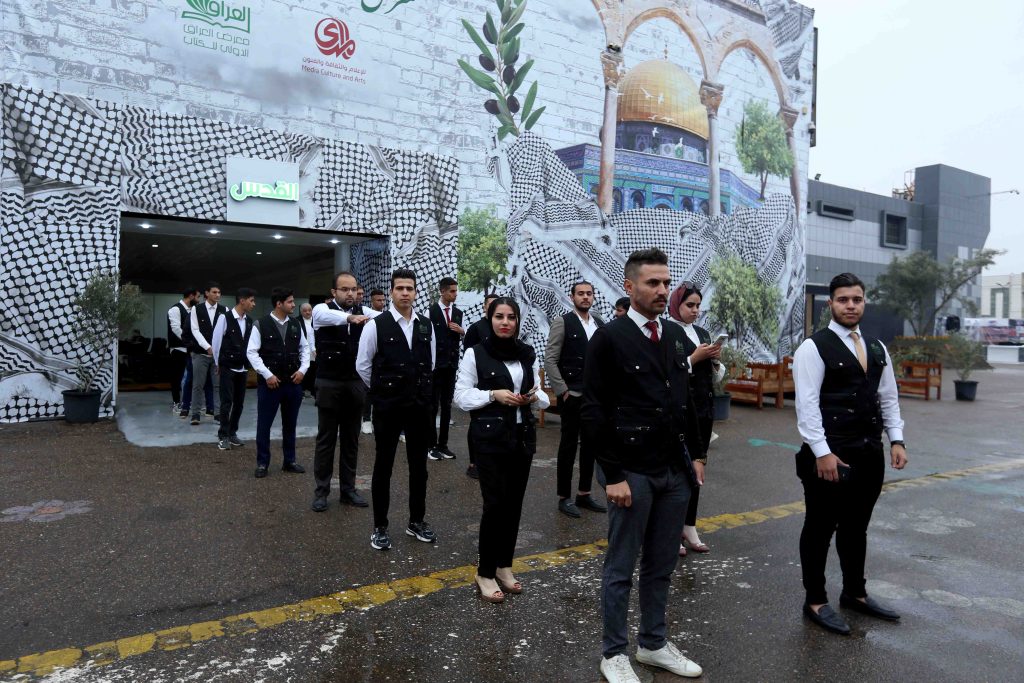
Almada
With the launch of the fourth session, the halls of the Iraqi International Book Fair carried the names of the most famous Palestinian historical cities (Jerusalem, Jenin, Nablus and Gaza), as the State of Palestine is the guest of honor at the exhibition, which is scheduled to start for 10 days.
The exhibition in its fourth session bears the name (Palestine) as an expression of solidarity with the cause of the Palestinian people, and a position against the Israeli aggression on Gaza, and dialogue and critical sessions will be allocated on (Palestine), throughout the days of the exhibition in which intellectuals and specialists participate, and the symbols of the Palestinian heritage will be present throughout the exhibition.
Jerusalem Hall
The hall, which bore the name of the city of Jerusalem, was dedicated to holding dialogue and critical sessions throughout the days of the Iraq International Book Fair. Jerusalem is known as the capital of the State of Palestine, and the first fixed name for the city of Jerusalem is (Ursalem), which appears in the Egyptian Amarna letters, and means the foundations of Salem; This name appeared twice in ancient Egyptian documents: around 2000 BC and 1330 BC.
It is noteworthy that the Jebusites are the builders of Jerusalem and they are one of the bellies of the first Arabs, they grew up in the heart of the Arabian Peninsula, and then displaced from it with those who were displaced from the Canaanite tribes to which they belong, and they were the first to inhabit Jerusalem, and the first to build a brick in it. When the Canaanites left Arabia, they departed in separate groups.
Jerusalem is characterized by Al-Haram Al-Sharif or Bayt al-Maqdis, one of the largest mosques in the world, and the first of the two qiblas in Islam, and it is mentioned in the Qur’an. Historians disagree about the date of construction of the Al-Aqsa Mosque, but it is mentioned in the hadiths, making it one of the oldest and holiest places of worship for Muslims. The Palestinian population in Jerusalem at the end of 2022 reached about 3 million and 200 thousand people.
It is noteworthy that the Palestinian cities are characterized by their heritage, history and distinctive hospitality habits, located in the heart of the world and are considered a meeting point between Africa, Europe and Asia, Palestine is characterized by the multiplicity of languages used in it and the multiplicity of cultures and beliefs, and Palestine is considered the cradle of monotheistic religions and a center for the most important religious monuments and historical evidence.
Jenin Hall
The hall, which bore the name of the city of Jenin, includes various local and Arab publishing houses, and the reason for naming the city by this name is because it is based on the land on which the city of (Ein Genim) was based, and in Canaanite it means Ain al-Janein. So it was so named because of the rockeries that surround it.
Jenin is the capital and largest city of Jenin Governorate, located in the northern West Bank of the Palestinian Authority. Historically, it is considered one of the cities of the Triangle in northern Palestine, 75 kilometers from Jerusalem to the north. Jenin overlooks the Jordan Valley to the east, and Marj Ben Amer to the north.
Jenin is largely an agricultural city as it constitutes the center of agricultural marketing and financing of the governorate, as its agricultural lands are one of the most fertile areas in the West Bank, where they are grown annually with field crops, vegetables and fruit trees such as olives, almonds and citrus, in addition to the widespread use of greenhouses.
At the time of construction, the camp had an area of 372 dunums, expanding to about 473 dunums. Its population in 1967 was 5,019; in 2007 it was 10,371. According to estimates by the Palestinian Central Bureau of Statistics, its population in mid-2023 is about 11,674 refugees.
Nablus Hall
Nablus Hall contains many Iraqi and Arab publishing houses, and it is said in the origin of the name Nablus that the Canaanites founded the city in the middle of the third millennium BC at the eastern entrance to the current city, and they called it at the time “Shechem”, which means high place, but the Romans demolished it during the period between 67 and 69 AD and established a new city to the west of it called “Neapolis” meaning the new city and then changed to “Nablus”.
The Palestinian city of Nablus is located in the northern part of the West Bank, 60 km north of Jerusalem. According to its strategic location between Mount Ebal and Mount Gerizim, Nablus is the largest cultural and commercial center in Palestine. As a city established by the Romans, the city has been ruled by many empires over the 2,000 years of its history.
The Palestinian city of Nablus is one of the largest Palestinian cities in terms of population, and Nablus is the center of the northern West Bank in addition to being the capital of the Nablus governorate, which includes 56 villages, and it also has several titles including Jabal al-Nar, Little Damascus, and the uncrowned queen of Palestine.
Gaza Hall
The hall, which bore the name of Gaza City, includes various Iraqi, Gulf and Arab publishing houses, and the reason for naming Gaza by this name is that the Canaanites called Gaza its name, which means “strength” in ancient Semitic languages. The Egyptians, on the other hand, called it “Ghazatu” (meaning the distinctive city).
By the end of 2023, the population in the Gaza Strip reached 2.3 million individuals, including 1.06 million children under the age of 18, constituting 47% of the Gaza Strip’s population. More than two months after the aggression on Gaza, 40% of the martyrs are children and about 30% are women.
Gaza is famous for the cultivation of citrus fruits in addition to fruit trees such as grapes, figs, berries and watermelons, where groundwater is available and a number of public and private underground wells, while the industrial sector is represented in the craft industry, workshops, some types of light industries and the citrus packaging industry, and there are many specialized markets in the city such as the grain and vegetable market.
It is noteworthy that the fourth session of the Iraq International Book Fair is held in cooperation with the General Union of Writers and Writers, and in coordination with the Association of Publishers and Writers in Iraq, and more than 350 Iraqi, Arab and foreign publishing houses from 16 countries participate in it.
